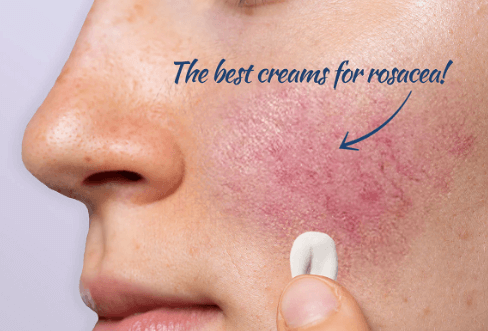Managing rosacea effectively requires a dedicated skincare regimen explicitly tailored for sensitive skin. This condition, characterized by redness, flushing, and sometimes acne-like bumps, can significantly impact confidence and comfort. Selecting the rosacea cream can be crucial in controlling flare-ups and maintaining skin health. This article will guide you through choosing the most effective creams for sensitive skin affected by rosacea, focusing on ingredients, suitability, and the benefits of specific formulations.
Understanding Rosacea and Skin Sensitivity
Rosacea is a chronic dermatological condition that primarily affects the face, leading to persistent redness, swelling, and pustular formations. Sensitive skin, which often accompanies rosacea, reacts more intensely to external and internal triggers, including stress, weather changes, and certain skincare products. Understanding these triggers and the skin’s specific needs is imperative to choosing products that mitigate symptoms without causing additional irritation.
Key Ingredients in Rosacea Creams
When selecting a cream for rosacea, it is essential to look for ingredients that calm inflammation, reduce redness, and strengthen the skin barrier. Ingredients like niacinamide, aloe vera, and green tea extract are known for their soothing and anti-inflammatory properties. Cams containing azelaic acid or metronidazole can also help manage the bumps and pimples associated with rosacea. It’s vital to choose formulations free from irritants such as alcohol, fragrances, and parabens to avoid exacerbating the condition. Moreover, incorporating ingredients like feverfew, oat extract, and chamomile can enhance calming effects, further soothing irritated skin. These gentle ingredients are crucial for maintaining skin comfort and minimising rosacea symptoms over time.
The Role of Moisturisers in Rosacea Care
Moisturising is a critical component in the care regimen for rosacea-prone skin. A good moisturiser hydrates the skin, locks in other therapeutic ingredients, and protects against environmental irritants. Look for products that contain ceramides and hyaluronic acid, which help maintain the skin’s natural barrier and prevent moisture loss. Additionally, selecting moisturisers labelled as non-comedogenic can avoid further clogging of pores, which is vital for rosacea sufferers. Squalane, a highly hydrating and lightweight oil, can be particularly effective for sensitive skin types without irritating. Regularly using such moisturisers can significantly alleviate tightness and dryness, making them a cornerstone of daily rosacea management.
Sun Protection for Rosacea Sufferers
Sun exposure is a well-known trigger for rosacea flare-ups. Thus, incorporating sunscreen into the daily skincare routine is crucial. Choose mineral-based sunscreens containing zinc oxide or titanium dioxide, as these ingredients are less likely to irritate sensitive skin. A broad-spectrum sunscreen with an SPF of 30 or higher is recommended. Applying sunscreen should be a daily habit, regardless of the weather, to protect sensitive skin from UV rays that can exacerbate rosacea symptoms. For added protection, look for sunscreens that contain antioxidants like vitamin C or E, which can combat free radical damage while soothing the skin. Physical measures such as wearing protective clothing and avoiding direct sunlight during peak hours can protect sensitive skin from flare-ups.
Choosing Hypoallergenic and Non-Comedogenic Products
For individuals with rosacea, selecting hypoallergenic and non-comedogenic skincare products is advisable. These products are designed to minimize the risk of allergic reactions and do not clog pores, reducing the likelihood of acne outbreaks that can complicate rosacea. Reading labels and choosing products endorsed by dermatologists or those formulated for sensitive skin can further prevent irritation and support skin health. Opting for fragrance-free options and avoiding harsh chemicals can also contribute to maintaining the delicate balance of the skin barrier, promoting a calmer complexion and reducing the severity of rosacea symptoms.
Lifestyle Modifications for Managing Rosacea
Lifestyle choices play a significant role in managing rosacea and can significantly influence the effectiveness of skincare treatments. Individuals with rosacea should consider adjusting routines to help reduce flare-ups and improve their skin’s condition. This includes managing stress levels, as stress is a known trigger for rosacea symptoms. Techniques like yoga, meditation, and regular physical activity can lower stress. Avoiding spicy foods, alcohol, and hot beverages, which can all exacerbate rosacea symptoms, is advised. Keeping a diary to track triggers can also be helpful, as it allows individuals to identify specific factors that worsen their condition. By understanding and modifying these lifestyle factors, those affected by rosacea can better control their symptoms, complementing the care provided by targeted skincare products.
Selecting the right skincare products, including an effective rosacea cream, is vital for managing rosacea and maintaining sensitive skin health. By understanding the specific needs of your skin type, choosing products with the right ingredients, and implementing a personalized care regimen, you can significantly reduce rosacea symptoms. Remember, each individual’s skin is unique, and what works for one person may not work for another. Consulting with a dermatologist can provide personalized advice and treatment options, helping you achieve the best possible results for your skin condition.


